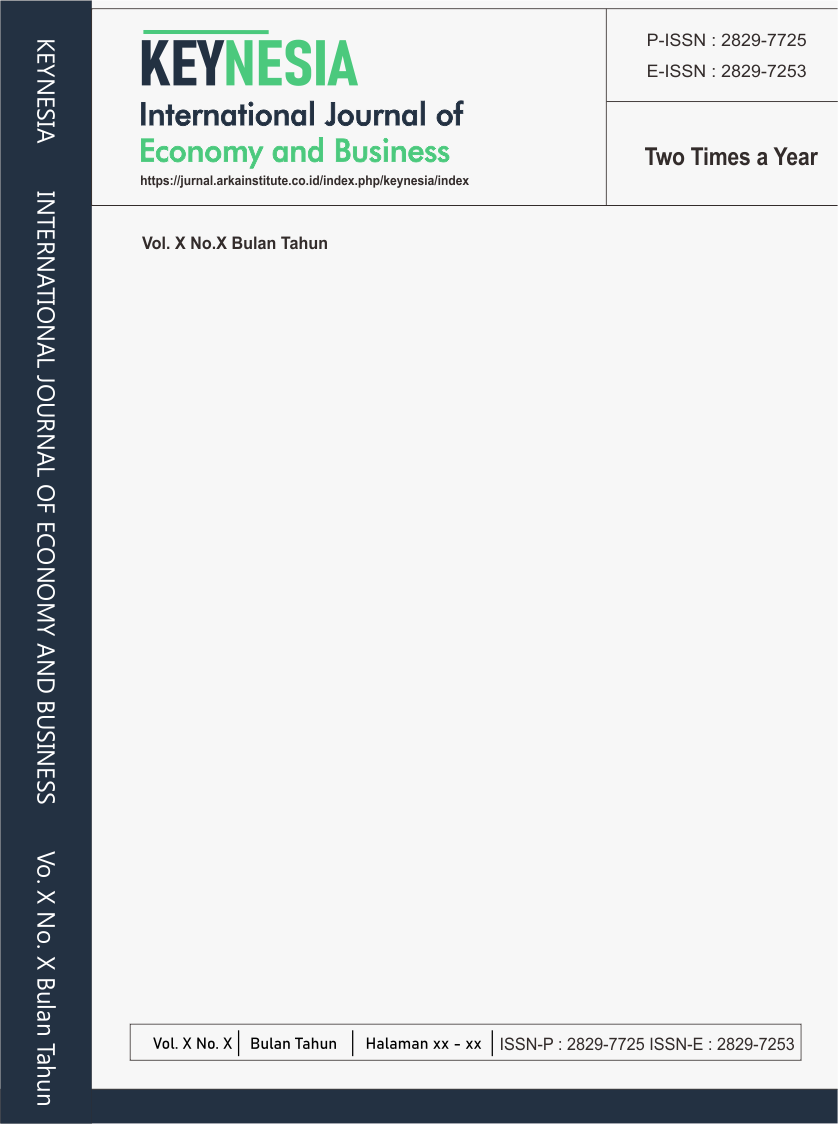Determinants of MSME awareness to register BPOM Certification: An empirical study in the BBPOM Mataram Region
Main Article Content
Abstract
Legal compliance in processed food products is a fundamental aspect of consumer protection and competitiveness for MSMEs in Indonesia. BPOM certification serves not only as a legal requirement but also as a strategic tool to access modern markets, financial support, and consumer trust. However, awareness among MSME actors to register for BPOM distribution permits remains low. This study aims to analyze the influence of knowledge, perceived benefits, perceived procedures, and BPOM support on awareness to register BPOM certification, with compliance as a mediating variable. Specifically, it investigates the indirect effects of knowledge, perceived benefits, and perceived procedures through compliance. The study employed a quantitative survey design involving 71 MSMEs in the jurisdiction of BBPOM Mataram that already possess a BPOM distribution permit (NIE). Data were collected via a Likert-scale questionnaire and analyzed using PLS-SEM with SmartPLS 3, including Importance-Performance Map Analysis (IPMA). Findings show that compliance and BPOM support significantly influence awareness, while knowledge, perceived benefits, and perceived procedures indirectly affect awareness through compliance. IPMA results position BPOM support and compliance in Quadrant I (high influence and performance), making them strategic priorities. The study contributes theoretically to the TPB framework by incorporating compliance as a behavioral mediator and offers practical recommendations for enhancing regulatory literacy, technical assistance, and procedural simplification.
Article Details
Section

This work is licensed under a Creative Commons Attribution-NonCommercial 4.0 International License.
References
Aswar, K., Julianto, W., Sumardjo, M., Panjaitan, I., & Nasir, A. (2023). An investigation of the factors affecting citizens’ adoption of e-government in Indonesia. Problems and Perspectives in Management, 21(2), 187. https://doi.org/10.21511/ppm.21(2).2023.21
Bhalla, N., Sharma, R. K., & Kaur, I. (2023). Effect of goods and service tax system on business performance of micro, small and medium enterprises. Sage Open, 13(2), 21582440231177210. https://doi.org/10.1177/21582440231177210
Cinelli, C., Forney, A., & Pearl, J. (2024). A crash course in good and bad controls. Sociological Methods & Research, 53(3), 1071–1104. https://doi.org/10.1177/00491241221099552
Dindi, P. D., & Stiegler, N. (2025). Charting the future of censuses: Insights, lessons and recommendations for the 2030 round. Statistical Journal of the IAOS, 41(2), 402–420. https://doi.org/10.1177/18747655251335763
Fathoni, M. A., Faizi, F., Suprima, S., Wiryanto, F. S., & Suryani, S. (2024). Exploring halal certification literacy measurement for micro small enterprises (MSEs). Review of Islamic Economics and Finance, 7(2), 1–14. https://doi.org/10.17509/rief.v7i2.73607
Hidayat, A. S., & Pok, W. C. (2025). Empowering SMEs innovation through intangible factors. Journal of Innovation and Entrepreneurship, 14(1), 1. https://link.springer.com/article/10.1186/s13731-024-00437-w
Hooper, R., Goyal, N., Blok, K., & Scholten, L. (2024). A semi-automated approach to policy-relevant evidence synthesis: combining natural language processing, causal mapping, and graph analytics for public policy. Policy Sciences, 57(4), 875–900. https://link.springer.com/article/10.1007/s11077-024-09548-3
Khuan, H., Judijanto, L., & Juminawati, S. (2024). Legal Regulations Pertaining to Product Safety and Quality Standards in MSMEs Business in Indonesia. The Easta Journal Law and Human Rights, 2(02), 97–105. https://doi.org/10.58812/eslhr.v2i02.210
Kurniasari, F., Gunawan, D., & Utomo, P. (2022). Factors influencing small medium enterprise’s behavior in adopting e-fulfillment services. International Journal of Professional Business Review: Int. J. Prof. Bus. Rev., 7(3), 9. https://dialnet.unirioja.es/servlet/articulo?codigo=8632965
Leong, M. D., Ismail, T. S. T., & Hwa, G. T. (2023). Anti-hypertensive prescription practices in private hospitals in Malaysia: a prospective, non-interventional, observational study. MJM, 78(3), 350. https://pubmed.ncbi.nlm.nih.gov/37271845/
Oemar, H., Prasetyaningsih, E., Bakar, S. Z. A., Djamaludin, D., & Septiani, A. (2023). Awareness and intention to register halal certification of micro and small-scale food enterprises. F1000Research, 11, 170. https://doi.org/10.12688/f1000research.75968.3
Perdana, P. N., Armeliza, D., Khairunnisa, H., & Nasution, H. (2023). Research data processing through structural equation model-partial least square (SEM-PLS) method. Jurnal Pemberdayaan Masyarakat Madani (JPMM), 7(1), 44–50. https://doi.org/10.21009/JPMM.007.1.05
Permani, R., Sahara, S., Satria, D., Suprehatin, S., & Nuryartono, N. (2025). The impacts of food certificate adoption on e-commerce income among small online agri-food sellers. Journal of Agribusiness in Developing and Emerging Economies, 15(3), 579–600. https://doi.org/10.1108/JADEE-10-2022-0231
Purnomo, H., Subagyo, S., SEOJOKO, D. K. H., & Leksono, P. Y. (2024). Access to credit, human resource development, market orientation, and regulatory compliance: determinants of MSME sustainability in Indonesia. West Science Social and Humanities Studies, 2(1), 190–199. https://repository.unpkediri.ac.id/12878/
Rönkkö, M., & Cho, E. (2022). An updated guideline for assessing discriminant validity. Organizational Research Methods, 25(1), 6–14. https://doi.org/10.1177/1094428120968614
Ruiz-Molina, M.-E., Gil-Saura, I., Berenguer-Contri, G., & Auch, C. (2019). Determinants of behavioral intentions towards a professional certification scheme at European level. European Journal of Training and Development, 43(7/8), 719–735. https://doi.org/10.1108/EJTD-01-2019-0001
Sedlakova, J., Stanikić, M., Gille, F., Bernard, J., Horn, A. B., Wolf, M., Haag, C., Floris, J., Morgenshtern, G., & Schneider, G. (2025). Refining Established Practices for Research Question Definition to Foster Interdisciplinary Research Skills in a Digital Age: Consensus Study With Nominal Group Technique. JMIR Medical Education, 11(1), e56369. https://mededu.jmir.org/2025/1/e56369/
Silalahi, S. A. F., Fachrurazi, F., & Fahham, A. M. (2022). Factors affecting intention to adopt halal practices: case study of Indonesian small and medium enterprises. Journal of Islamic Marketing, 13(6), 1244–1263. https://doi.org/10.1108/JIMA-05-2020-0152
Singh, R., & Puniya, A. K. (2024). Role of food safety regulations in protecting public health. Indian Journal of Microbiology, 64(3), 1376–1378. https://link.springer.com/article/10.1007/s12088-024-01240-7
Tan, B. C., Lau, T. C., Sarwar, A., & Khan, N. (2022). The effects of consumer consciousness, food safety concern and healthy lifestyle on attitudes toward eating “green.” British Food Journal, 124(4), 1187–1203. https://doi.org/10.1108/BFJ-01-2021-0005
Toyon, M. A. S. (2021). Explanatory sequential design of mixed methods research: Phases and challenges. International Journal of Research in Business and Social Science, 10(5), 253–260. https://doi.org/10.20525/ijrbs.vl0i5.1262
Wahyudi, T., Pohan, E. S., Utami, F., Nofianti, N., Soleha, N., Syaifudin, R., & Desmawan, D. (2025). Open Innovation Ecosystems and Competitive Advantage in Green Technologies: A Systematic Review. Accounting, Organization, and Information System, 1(1). https://journalnetworth.com/index.php/aois/article/view/2
Yahaya, A. R., & Balan, E. (2025). Franchise Brand Perception in Malaysia: An Empirical Analysis of Leadership Engagement and Regulatory Frameworks. Journal of Science, Technology and Innovation Policy, 11(1), 1–21. https://doi.org/10.11113/jostip.v11n1.155

